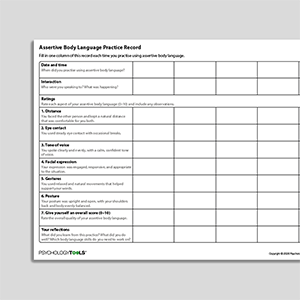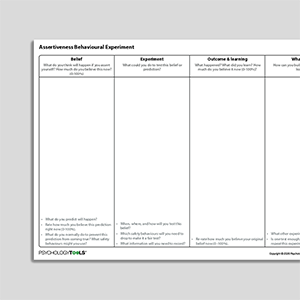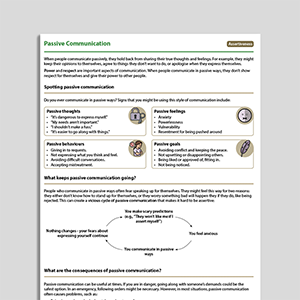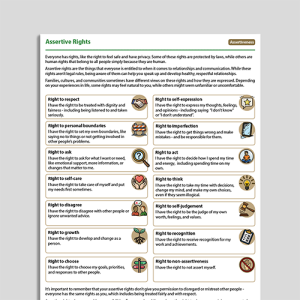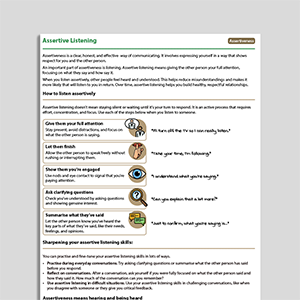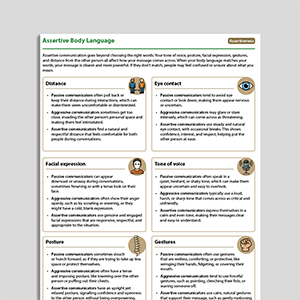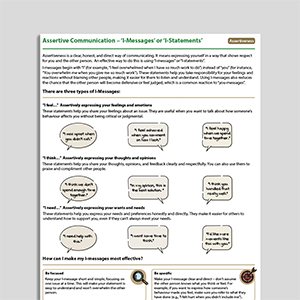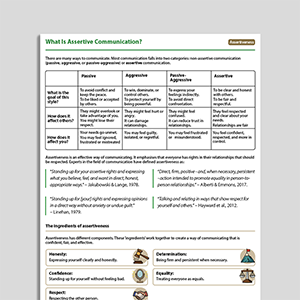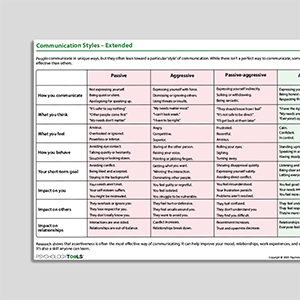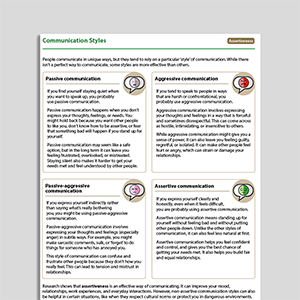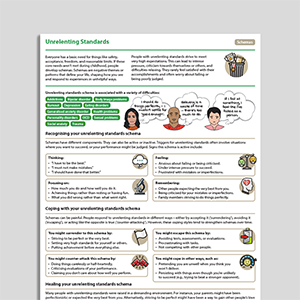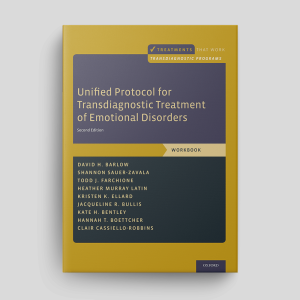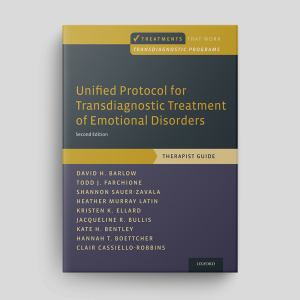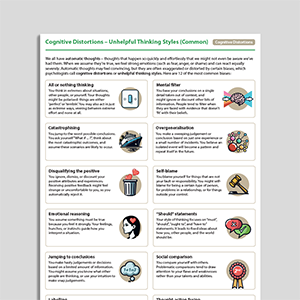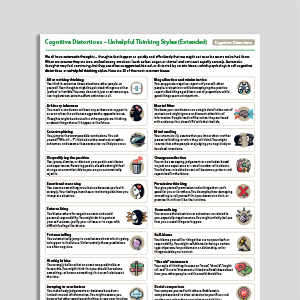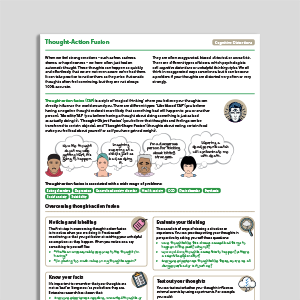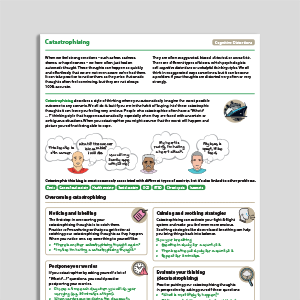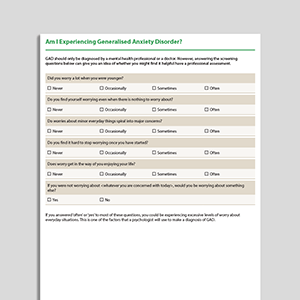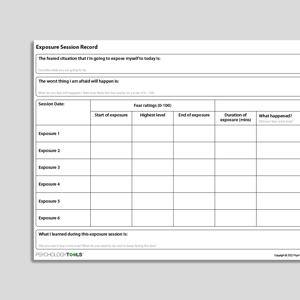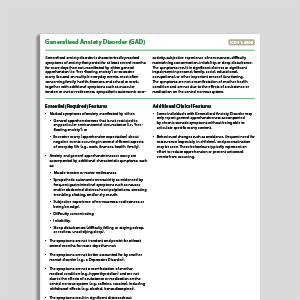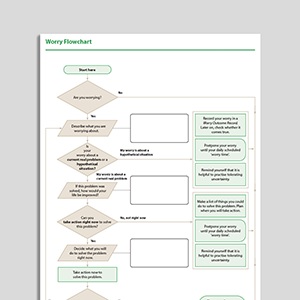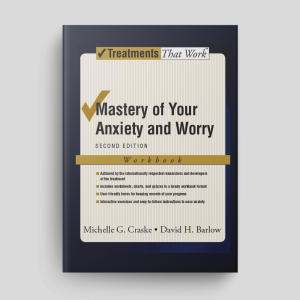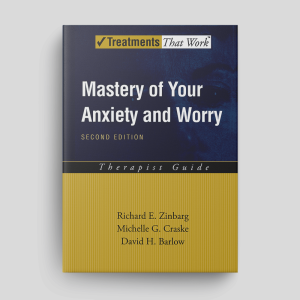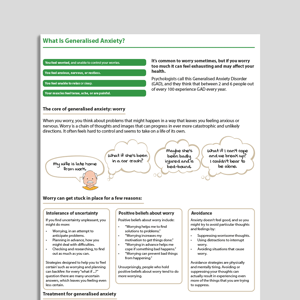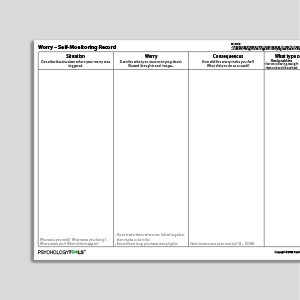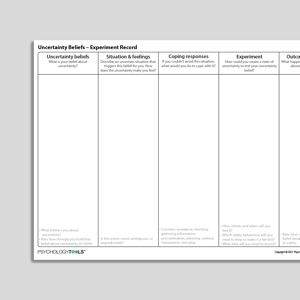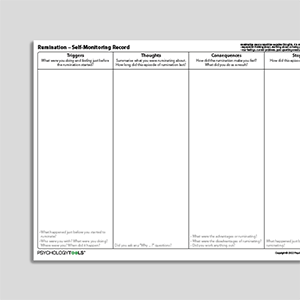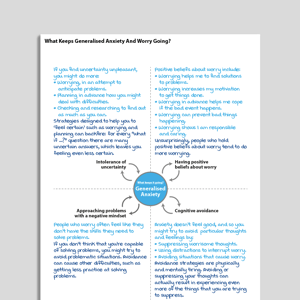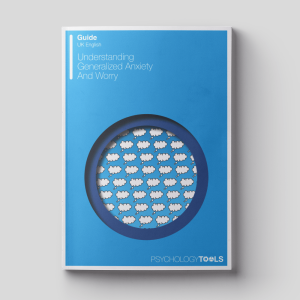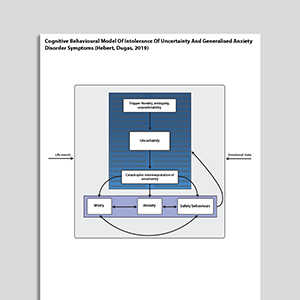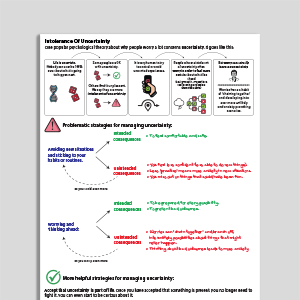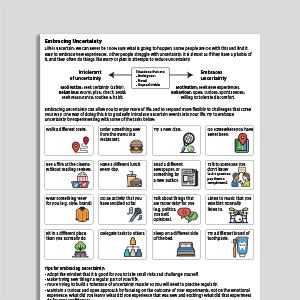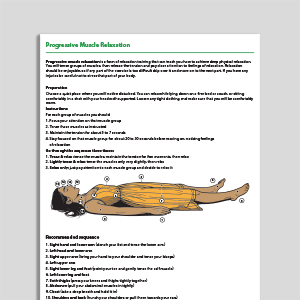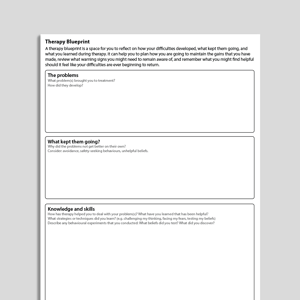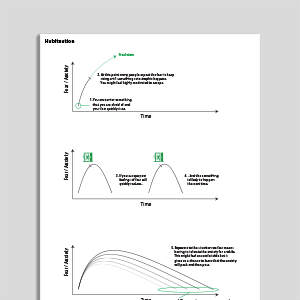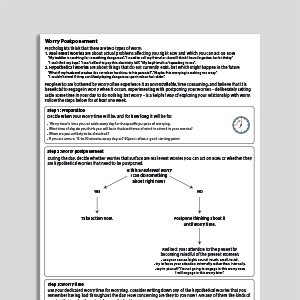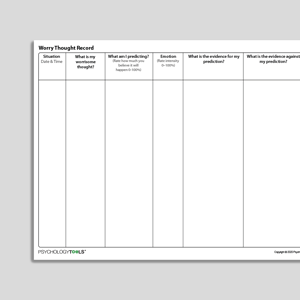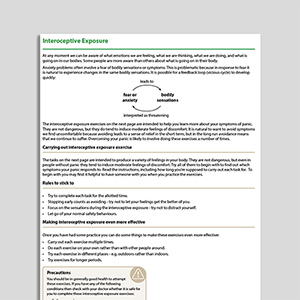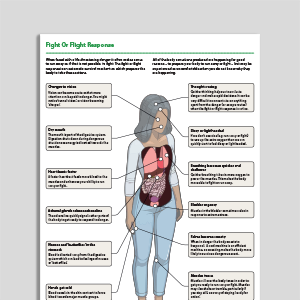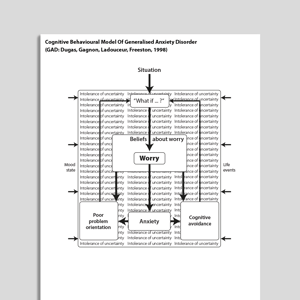Generalized Anxiety Disorder (GAD)
Generalized anxiety disorder (GAD) is a common and persistent mental health condition characterized by excessive and uncontrollable worry about a range of everyday situations, such as health, finances, or relationships. Unlike situational anxiety, GAD involves pervasive worry that is difficult to control and often accompanied by physical symptoms such as restlessness, fatigue, muscle tension, and sleep disturbances. This chronic anxiety can impair daily functioning, reduce quality of life, and increase the risk of developing comorbid conditions such as depression. Evidence-based treatments, including cognitive behavioral therapy (CBT), have demonstrated significant efficacy in reducing symptoms and helping individuals better manage their worry and anxiety.
Showing 1 to 40 of 40 results
Assertiveness Behavioral Experiment
Assertiveness Behavioral Experiment
Assertive Communication – 'I-Messages' Or 'I-Statements'
Assertive Communication – 'I-Messages' Or 'I-Statements'
What Is Assertive Communication?
What Is Assertive Communication?
Communication Styles – Extended
Unified Protocol for Transdiagnostic Treatment of Emotional Disorders (Second Edition): Client Workbook
Unified Protocol for Transdiagnostic Treatment of Emotional Disorders (Second Edition): Client Workbook
Unified Protocol for Transdiagnostic Treatment of Emotional Disorders (Second Edition): Therapist Guide
Unified Protocol for Transdiagnostic Treatment of Emotional Disorders (Second Edition): Therapist Guide
Cognitive Distortions – Unhelpful Thinking Styles (Common)
Cognitive Distortions – Unhelpful Thinking Styles (Common)
Cognitive Distortions – Unhelpful Thinking Styles (Extended)
Cognitive Distortions – Unhelpful Thinking Styles (Extended)
Am I Experiencing Generalized Anxiety Disorder (GAD)?
Am I Experiencing Generalized Anxiety Disorder (GAD)?
Recognizing Generalized Anxiety Disorder (GAD)
Recognizing Generalized Anxiety Disorder (GAD)
Mastery Of Your Anxiety And Worry (Second Edition): Workbook
Mastery Of Your Anxiety And Worry (Second Edition): Workbook
Mastery Of Your Anxiety And Worry (Second Edition): Therapist Guide
Mastery Of Your Anxiety And Worry (Second Edition): Therapist Guide
What Is Generalized Anxiety Disorder (GAD)?
What Is Generalized Anxiety Disorder (GAD)?
Worry – Self-Monitoring Record
Worry – Self-Monitoring Record
Uncertainty Beliefs – Experiment Record
Uncertainty Beliefs – Experiment Record
Rumination - Self-Monitoring Record
Rumination - Self-Monitoring Record
What Keeps Generalized Anxiety And Worry Going?
What Keeps Generalized Anxiety And Worry Going?
Understanding Generalized Anxiety And Worry
Understanding Generalized Anxiety And Worry
Cognitive Behavioral Model Of Intolerance Of Uncertainty And Generalized Anxiety Disorder Symptoms (Hebert, Dugas, 2019)
Cognitive Behavioral Model Of Intolerance Of Uncertainty And Generalized Anxiety Disorder Symptoms (Hebert, Dugas, 2019)
Intolerance Of Uncertainty
Intolerance Of Uncertainty
Cognitive Behavioral Model Of Generalized Anxiety Disorder (GAD: Dugas, Gagnon, Ladouceur, Freeston, 1998)
Cognitive Behavioral Model Of Generalized Anxiety Disorder (GAD: Dugas, Gagnon, Ladouceur, Freeston, 1998)
Links to external resources
Psychology Tools makes every effort to check external links and review their content. However, we are not responsible for the quality or content of external links and cannot guarantee that these links will work all of the time.
Assessment
-
Severity Measure For Generalized Anxiety Disorder
| Craske, Wittchen, Bogels, Stein, Andrews, Lebeu | 2013
- Scale – Adult
- Scale – Child Age 11-17
Guides and workbooks
- Generalised anxiety disorder: patient treatment manual | Clinical Research Unit for Anxiety and Depression (CRUfAD)
Information Handouts
-
Generalised anxiety and worry - information sheets
| Centre For Clinical Interventions
- What Is Generalised Anxiety?
- What Is Mindfulness?
- Mindfulness and Letting Go
- How Worry Works
- Postpone Your Worry
- Accepting Uncertainty
- What Is Distress Intolerance? | Centre For Clinical Interventions
Information (Professional)
- Intolerance of uncertainty model: a guide to using the Dugas & Robichaud CBT protocol for GAD | Helen Moya
Presentations
- Why worry? Key cognitive processes that maintain worry and Generalised Anxiety Disorder | Colette Hirsch
Self-Help Programmes
-
What? Me Worry? (Workbook)
| Centre For Clinical Interventions | 2015
- Module 1: Overview Of Generalized Anxiety
- Module 2: Overview Of Worrying
- Module 3: Challenging Uncontrollability Beliefs
- Module 4: Attention Training
- Module 5: Challenging Danger Beliefs
- Module 6: Challenging Positive Beliefs
- Module 7: Problem-Solving
- Module 8: Helpful Thinking
- Module 9: Accepting Uncertainty
- Module 10: Self Management Plan
Treatment Guide
- NICE Guidelines For GAD And Panic | NICE | 2011
Worksheets
-
Anxiety (Worksheets)
| Centre For Clinical Interventions
- Anxiety Symptoms Record
- Breathing Rate Record
- Monitoring Relaxation
- Situational Exposure Diary
- Making The Connection
- Thought Diary 1
- Thought Diary 2
- Thought Diary 3
- Thought Diary (Tri-Fold)
- Behavioral Experiment Worksheet
-
Generalised Anxiety And Worry (Worksheets)
| Centre For Clinical Interventions
- Postpone Your Worry
- Letting Go With Mindfulness
- Accepting Uncertainty
- Challenging Intolerance of Uncertainty
Recommended Reading
- Borkovec, Thomas D., & Newman, Michelle G. (1998). Worry and generalized anxiety disorder. In A. S. Bellack, & M. Hersen (Series Eds.), & P. Salkovskis (Vol. Ed.), Comprehensive clinical psychology: Vol. 6. Adults: Clinical formulation and treatment. (pp. 439-459). Oxford, England: Pergamon Press. | Borkovec, Newman | 1998
- Hirsch, C. R., & Mathews, A. (2012). A cognitive model of pathological worry. Behaviour research and therapy, 50(10), 636-646. | Hirsch, Matthews | 2012
What Is Generalized Anxiety Disorder?
According to the DSM-5, GAD is characterized by excessive anxiety and worry about various activities or events occurring on most days for at least six months. The individual finds it difficult to control the worry, which is associated with at least three of the following symptoms:
Restlessness or feeling keyed up.
Fatigue.
Difficulty concentrating or mind going blank.
Irritability.
Muscle tension.
Sleep disturbances (difficulty falling or staying asleep, or restless, unsatisfying sleep).
The ICD-11 defines GAD similarly, emphasizing excessive worry that is generalized rather than focused on specific situations or objects. Symptoms must result in significant distress or impairment in personal, social, or occupational functioning.
Incidence and Predictors of GAD
Generalized anxiety disorder is one of the most prevalent anxiety disorders, with a lifetime prevalence of approximately 5–6% worldwide (Kessler et al., 2005). Predictors of GAD include genetic predispositions, environmental stressors, and psychological vulnerabilities. Cognitive biases, such as a tendency to overestimate the likelihood or severity of threats, play a significant role in the development of GAD (Dugas & Robichaud, 2007). Early life adversity, such as parental overcontrol or trauma, can also increase susceptibility to GAD (Hudson & Rapee, 2005; Green et al, 2010)
Psychological Models and Theories of Generalized Anxiety Disorder
Cognitive behaviorals models of GAD have been most extensively researched (e.g., Behar et al., 2009). According to the Avoidance Model of Worry and GAD (Borkovec, 1994; Borkovec et al., 2004; Bernstein et al, 2000; Borkovec & Sharpless, 2004), worry functions as a cognitive avoidance strategy, helping individuals avoid emotional processing of distressing thoughts or images. By engaging in worry, individuals prevent the emotional intensity associated with feared outcomes, but this avoidance paradoxically maintains their anxiety over time.
The Intolerance of Uncertainty Model (Dugas et al., 1998; Hebert & Dugas, 2019; Robichaud et al, 2019) highlights intolerance of uncertainty as a key maintaining factor in GAD. Individuals with GAD struggle to tolerate ambiguity or uncertainty, which leads to excessive worry as an attempt to predict and control future outcomes. This model underscores the importance of targeting intolerance of uncertainty in treatment.
The Metacognitive Model (Wells, 1995; Wells, 2011) focuses on how individuals with GAD hold dysfunctional beliefs about worry itself. For example, they may believe that worry is necessary to prevent negative outcomes, but also view their worry as uncontrollable and harmful. These conflicting beliefs create a self-reinforcing cycle of worry.
The Emotional Dysregulation Model (Mennin et al., 2005) suggests that individuals with GAD experience heightened emotional intensity and have difficulty regulating their emotions. This leads to increased worry as a maladaptive strategy to manage overwhelming feelings.
Evidence-Based Psychological Approaches for GAD
Cognitive behavioral therapy (CBT) is the leading treatment for GAD, with a robust evidence base supporting its efficacy (Papola et al., 2024). It focuses on identifying and challenging maladaptive thoughts and beliefs, particularly those related to overestimation of threats and intolerance of uncertainty. Behavioral techniques, such as relaxation training and exposure to feared situations or thoughts, help patients reduce avoidance behaviors and improve emotional regulation. Studies consistently show that CBT significantly reduces worry and anxiety, with lasting benefits (Dugas & Robichaud, 2007; Cuijpers et al., 2014).
Acceptance and Commitment Therapy (ACT) focuses on helping individuals accept their anxious thoughts and feelings without judgment while committing to value-driven actions. By reducing avoidance and fostering psychological flexibility, ACT helps patients engage meaningfully in their lives despite anxiety. Some research demonstrates the effectiveness of ACT in the treatment of GAD (e.g. Arch & Craske, 2008; Hayes et al, 2006)
Metacognitive Therapy (MCT) targets maladaptive beliefs about worry, teaching individuals to disengage from unhelpful thought patterns. This approach is particularly effective for addressing the worry-related metacognitions that maintain GAD (Wells, 2011). In one trial, MCT outperformed CBT in the treatment of GAD (Nordahl et al, 2018).
Emotion Regulation Therapy (ERT) represents a promising integrative approach. ERT combines principles from affect science with traditional and contemporary cognitive-behavioral strategies to target negative self-referential processing (e.g., worry, rumination) and improve emotion regulation. An RCT by Mennin et al. (2018) demonstrated that ERT led to significant improvements in worry, rumination, functional impairment, and quality of life.
Mindfulness-based interventions, such as Mindfulness-Based Stress Reduction (MBSR), help individuals focus on the present moment and develop a nonjudgmental awareness of their thoughts and feelings. These practices have been shown to reduce worry and improve overall emotional well-being in individuals with GAD (Hofmann et al., 2010).
Resources for Working with GAD
Psychology Tools offers a variety of resources for understanding and treating GAD, including:
Cognitive-behavioral formulations and worksheets for GAD.
Handouts explaining the role of worry and intolerance of uncertainty.
Relaxation and mindfulness exercises for managing anxiety.
Behavioral experiments and exposure exercises.
Psychoeducation materials on the maintenance of GAD.
References and Further Reading
Arch, J. J., & Craske, M. G. (2008). Acceptance and commitment therapy and cognitive behavioral therapy for anxiety disorders: Different treatments, similar mechanisms? Clinical Psychology: Science and Practice, 15(4), 263–279.
Behar, E., DiMarco, I. D., Hekler, E. B., Mohlman, J., & Staples, A. M. (2009). Current theoretical models of generalized anxiety disorder (GAD): Conceptual review and treatment implications. Journal of Anxiety Disorders, 23, 1011-1023.
Bernstein, D.A., Borkovec, T.D., & Hazlett-Stevens, H. (2000). New directions in progressive relaxation training: A guidebook for helping professionals. Westport, CT: Praeger Publishers
Borkovec, T. D. (1994). The nature, functions, and origins of worry. In G. C. L. Davey & F. Tallis (Eds.), Worrying: Perspectives on theory, assessment and treatment (pp. 5–33). Wiley.
Borkovec, T. D., Alcaine, O., & Behar, E. (2004). Avoidance theory of worry and generalized anxiety disorder. Generalized Anxiety Disorder: Advances in Research and Practice, 77–108.
Borkovec, T.D., & Sharpless, B. (2004). Generalized Anxiety Disorder: Bringing Cognitive Behavioral Therapy into the Valued Present. In S. Hayes, V. Follette, & M. Linehan (Eds.), New directions in behavior therapy, pp. 209-242. New York: Guilford Press.
Cuijpers, P., Sijbrandij, M., Koole, S. L., et al. (2014). Psychological treatment of generalized anxiety disorder: A meta-analysis. Clinical Psychology Review, 34(2), 130–140.
Dugas, M. J., & Robichaud, M. (2007). Cognitive-behavioral treatment for generalized anxiety disorder: From science to practice. Routledge.
Etkin, A., & Wager, T. D. (2007). Functional neuroimaging of anxiety: A meta-analysis of emotional processing in PTSD, social anxiety disorder, and specific phobia. American Journal of Psychiatry, 164(10), 1476–1488.
Green, J. G., McLaughlin, K. A., Berglund, P. A., et al. (2010). Childhood adversities and adult psychiatric disorders in the National Comorbidity Survey Replication I: Associations with first onset of DSM-IV disorders. Archives of General Psychiatry, 67(2), 113–123.
Hayes, S. C., Luoma, J. B., Bond, F. W., et al. (2006). Acceptance and commitment therapy: Model, processes, and outcomes. Behaviour Research and Therapy, 44(1), 1–25.
Hebert, E. A., & Dugas, M. J. (2019). Behavioral experiments for intolerance of uncertainty: Challenging the unknown in the treatment of generalized anxiety disorder. Cognitive and Behavioral Practice, 26(2), 421-436.
Hofmann, S. G., Sawyer, A. T., Witt, A. A., & Oh, D. (2010). The effect of mindfulness-based therapy on anxiety and depression: A meta-analytic review. Journal of Consulting and Clinical Psychology, 78(2), 169–183.
Hudson, J. L., & Rapee, R. M. (2005). Parental overprotection and the development of anxiety: A meta-analytic review. Clinical Psychology Review, 25(2), 171–190.
Mennin, D. S., Fresco, D. M., O'Toole, M. S., & Heimberg, R. G. (2018). A randomized controlled trial of emotion regulation therapy for generalized anxiety disorder with and without co-occurring depression. Journal of consulting and clinical psychology, 86(3), 268.
Mennin, D. S., Heimberg, R. G., Turk, C. L., & Fresco, D. M. (2005). Applying an emotion regulation framework to integrative approaches to generalized anxiety disorder. Clinical Psychology: Science and Practice, 12(2), 101–130.
Nordahl, H. M., Borkovec, T. D., Hagen, R., et al. (2018). Metacognitive therapy versus cognitive-behavioural therapy in adults with generalised anxiety disorder: A randomized controlled trial. British Journal of Psychiatry, 212(2), 102–108.
Papola, D., Miguel, C., Mazzaglia, M., Franco, P., Tedeschi, F., Romero, S. A., ... & Barbui, C. (2024). Psychotherapies for generalized anxiety disorder in adults: A systematic review and network meta-analysis of randomized clinical trials. JAMA psychiatry, 81, 250-259.
Robichaud, M., Koerner, N., & Dugas, M. J. (2019). Cognitive behavioral treatment for generalized anxiety disorder: From science to practice. Routledge.
Wells, A. (1995). Cognitive therapy of anxiety disorders: A practice manual and conceptual guide. Wiley.
Wells, A. (2011). Metacognitive therapy for anxiety and depression. Guilford Press.
